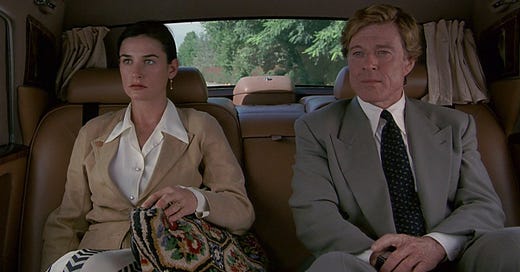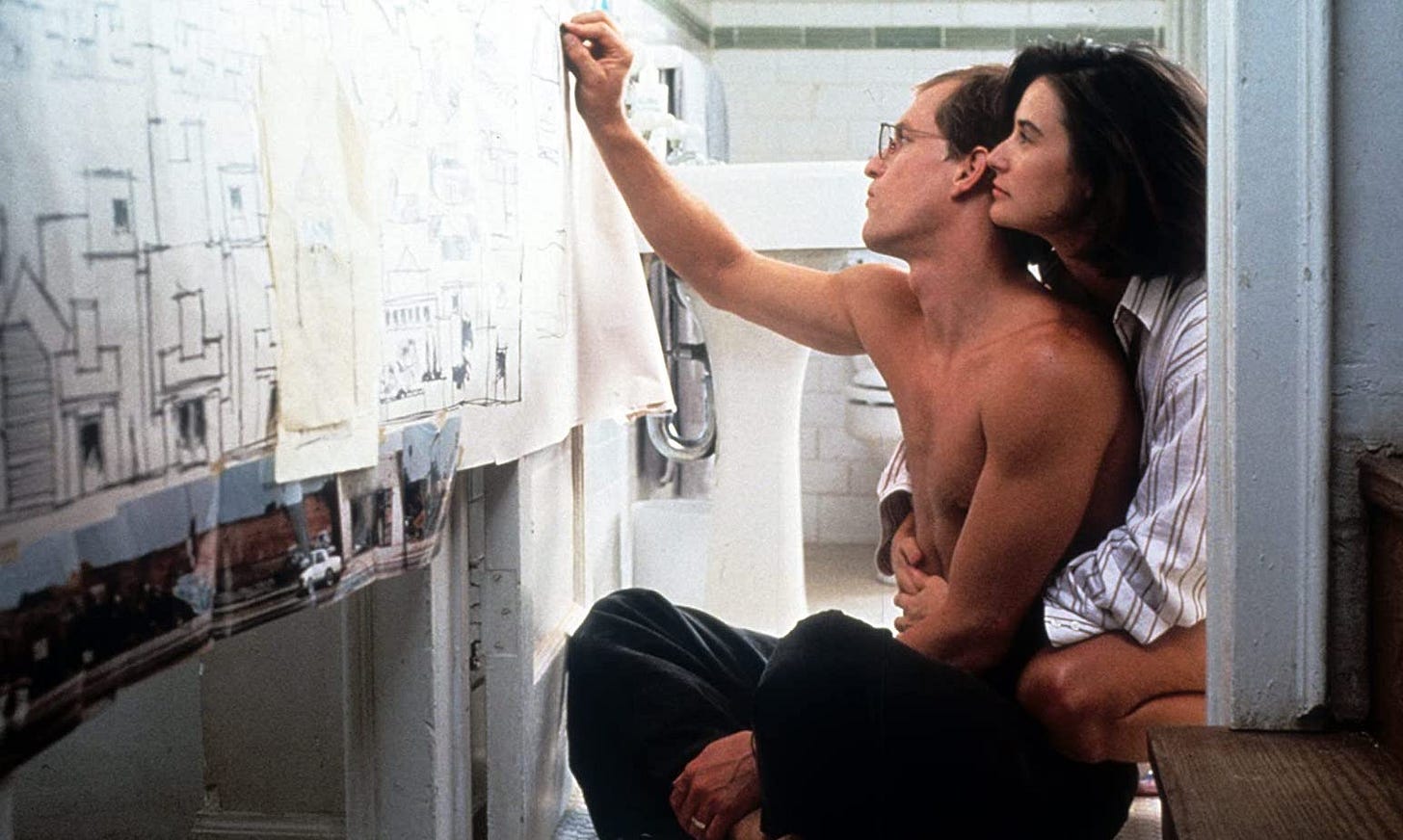Idea>Execution: Turns Out Indecent Proposal Sucks
I caught up with a well-known movie I'd never seen before, and I wish I hadn't bothered
My wife and I recently had a discussion that was prompted by a TikTok video in which a creator asked, “What is your Indecent Proposal number?”
The gist is: what is the amount that you would accept for someone else to sleep with your partner, or alternately, how much would you insist on being paid to sleep with someone other than your partner? It’s based, of course on the plot of the movie Indecent Proposal, and during the course of talking about it, I noted that I had never actually seen the movie, so that apparently had to be immediately rectified.
And, well, I kind of wish I hadn’t bothered, because it was really bad. Afterward, I logged my viewing on Letterboxd, and while I usually just write a short blurb on there, I ended up putting together several paragraphs, since this movie seemed to have struck a chord. I thought it was worth sharing here and potentially expanding on it a bit to discuss why I thought this is a movie that has a killer concept that sticks in the imagination but does not in any way live up to the promise of the premise:
This is one of those movies that people say doesn't get made anymore, being a low-key drama aimed at adults. However, now that I've watched it, I'm feeling like that's not a bad thing. It's got a pretty juvenile idea of adulthood, with characters playing architects, real estate agents, and undefined rich people with no real concept of what these people would do in real life. Woody Harrelson is one of those movie architects who draws elaborate diagrams in charcoal on large sheets of paper hung up around his home, designing his dream home, which is apparently his sole aspiration in life. Even though he and Demi Moore are supposed to be struggling, middle class types, they can somehow afford to buy beachfront property in Santa Monica to build it. And then when they fall on hard times, they figure the best solution is to head to Las Vegas and win enough money to make up the back payments on their mortgage.
This is the kind of ridiculousness the movie starts with, so it's not surprising that they would stumble across a billionaire who is ready to fix their problems by offering a million dollars in exchange for sex. But even though real life billionaires are odious, misanthropic creatures who who have gotten where they are either through inheritance or exploitation, this one is played by Robert Redford, so he's suave and charming. Even though he's manipulative and self-serving, he has to have a bit of a heart of gold so that he can seem like a potential romantic rival. He's absolutely one of the worst people in the world, and he's presented as a nice guy who's maybe just misunderstood.
Even though the point of this movie seems to be how the proposal of the title would immediately tear a couple apart, it barely examines what this situation would actually be like. They pretty much just instantly devolve into arguments and jealousy, but there's no consideration of how the money they make would be life-changing. The million dollars is just something they can argue over and then give away so that they can go back to where they started, with little in the way of growth or character development. I don't think anyone actually learned anything in this movie; they just went through an experience and then went back to their lives. Hopefully I can do the same without being haunted by wasted potential.
That sums up my problems with the movie pretty well, but why not go into more detail about everything I didn’t like? First off: it’s one of those movies that gives its characters what seem like jobs that real people would have, with no concept of what these jobs are actually like. Woody Harrelson is an architect, but it seems that he has designed a grand total of one building in his life, an ugly house that he hopes to build one day. Even though a voiceover tells us how much he loves to walk around and point out features of buildings that he loves, the only example is a moment in which he apparently gets excited about the gaudy logo adorning a car wash. After he goes through a bunch of drama, he apparently finds a new purpose in life as a teacher, and he gets a scene in which he gives his students a big speech about architecture, and it’s one of the lamest, most basic examples of an “inspirational” movie speech about creativity I’ve ever seen. It climaxes with him holding up a brick and talking about how it wants to be something great, and as an example, he shows a slide of the Chrysler Building, since that’s something that viewers will probably recognize. There’s just nothing to this guy, or really anyone else in the movie, so why should I care what happens to his relationship?
Demi Moore’s job as a real estate agent gets even less attention. It’s barely mentioned before the plot kicks in, and later, when she and Woody experience relationship problems, she says that she has taken to just staring at the walls all day. That’s not really an option for real estate agents; they need to be selling houses in order to make any money. Her job is basically just an excuse for the other notable character in the movie to show up and pursue her.
And that brings us to Robert Redford, who is one of those undefined multi-millionaires who has lots of money but doesn’t actually seem to do anything businesslike. He keeps offering to have people come work for him, and he has a right-hand man played by Seymour Cassel who apparently handles various tasks for him, but there’s no indication that he does anything other than being a rich guy. That might not be too far-fetched, since people who are rich enough can probably get others to do most of their work for them, but as with everything else in the movie, it seems to be more of a fantasy of what a guy like this would be like rather than anything approaching reality.
That’s far from the only problem with Redford’s character though. While it’s not uncommon for movies to romanticize rich people, it’s weird for this movie to take a guy who is clearly unethical and make him one of the romantic leads. The main action that kicks the plot into gear is when he offers the couple a million dollars to spend a night with Demi Moore, and it’s clear that he’s doing so just to be a jerk, to prove that money really can buy everything and that people’s morals will crumble when offered a bargain that they can’t refuse. Later, when Moore and Harrelson break up and Redford decides that he wants to start pursuing her, he follows her around persistently, pretending to hire her to show him high-value homes, and basically refusing to take no for an answer until she gives in and starts a relationship with him.
This is all very gross behavior, but the movie wants to make him one of the sides of a romantic triangle, so it’s all brushed under the table as he acts charming and Robert Redford-like. Despite the way he treats other people like objects to be bought and sold, and he delights in using his wealth to gain power and influence over others, he’s apparently one of those mythical ethical billionaires that we know don’t exist outside of fantasy. He even gets to selflessly give Demi Moore a reason to get back together with Woody Harrelson at the end, because he’s just that nice of a guy.
So, character-wise, this movie is pretty bad, but at least it raises some interesting ideas right? Unfortunately, no, it’s all there in the one-sentence summary of the plot. There’s no real examination of how this situation would affect a couple and their relationship. They agree to the offer after a modicum of discussion, decide they will never talk about it after it happens, and immediately start having relationship-ending arguments about the experience. Did Moore do it for Harrelson, to give him the money he needed to save his dream house? Did he agree to it out of selfishness? Was she actually attracted to Redford and took the opportunity to do something she wanted to do anyway? Was he any good in bed? Will she be staying in contact with Redford? And so on.
While there’s a little bit of real feeling there, it’s not really explored before they just decide to break up. A well-written exploration of this idea could have let things smolder a bit more, showing us how they both believed they agreed to the deal for good reasons, but the choice started eating them up inside, making it impossible to ever move past. The inability to talk about emotions can be fatal to many relationships, and this could have been an exploration of how lingering jealousy and regret could poison an experience that didn’t have to be the downfall of their marriage if they had just spoken to each other.
Possibly more annoying is the complete lack of consideration for how gaining a million dollars through this experience would have changed the couple’s lives. Their stated goal was to prevent the loss of the dream house Woody was building, but that gets immediately taken off the table when Redford swoops in and buys the property out from under them (did I mention that he’s an irredeemable jerk?). So without that to worry about, the money just becomes an abstract idea to argue about, with both Moore and Harrelson saying they don’t want it, and Woody eventually giving it away in a grand gesture to get Demi back.
That’s probably the surest sign that this is all a fantasy that has nothing to do with real life. For pretty much any couple, including the leads here, who are shown to be struggling financially, unable to maintain steady work, and worrying about debts, this amount of money would be life-changing. All of their financial stressors would instantly be gone, even if they didn’t get the house they wanted. They wouldn’t necessarily be living in luxury, but they would be comfortable for at least the next several years. In fact, this could have added to the slow-burn emotional conflicts discussed earlier. They could have been living a life that looked happy from the outside, while internally everything was falling apart. But the movie isn’t interested in anything approaching that level of emotional complexity. It wants to be a romantic comedy that ends with a couple who has broken up due to a misunderstanding walking off together into the sunset, without a care in the world (other than the loss of a massive fortune and the still-unresolved question of whether their relationship can survive serious conflicts).
I’m sure my problem here is that I wanted this movie to be something it’s not. The idea of someone’s “Indecent Proposal number” is compelling, something that can prompt a couple to delve into mature, adult topics that are much deeper than anything this movie would ever approach. But I still feel like it’s a missed opportunity. It’s an example of a movie that presents an interesting concept, then completely fails to explore the ramifications of the idea or do anything interesting with it. We should coin a term for movies or other stories that have good ideas but poor execution. It’s something I’ll be pondering, and it might prompt more essays as I think of other examples and delve into why they just didn’t work.









Well-written piece, Matthew! Everything about the film sounds so bad, but also sounds very early 90s, trying to appeal to the Skinemax crowd, but with just a touch of class in the moral dilemma. Except the execution is so poor, the class is nowhere to be found.
I don't know what I'm talking about. Movie bad, review good!
Interesting & worthwhile review—a contrast, it sounds like, from the movie :) I've never seen the movie—a life choice I feel ratified in after reading this—but at the time I heard about it, of course,* and your thoughts on the difficulty of their making Robert Redford, acting like a creep, into a romantic lead reminds me of a joke I heard around the time the movie came out: "Would you sleep with Robert Redford for a million dollars?" "Sure, but you'd have to give me some time to come up with the money."
Which leads me to another thought: there was a meme some years ago about "what movie would be improved if you remade it exactly as is except swapping Danny Devito into one of the roles?".** This sounds like it would have been a good answer!
* I think when people complain they don't make adult (i.e. mature, not x-rated) movies any more, what they mean is that they used to be central to cultural conversation in the sense that of COURSE I'd have HEARD of this implies, whereas nowadays the movies you heard about tend to be franchises.
** I still like my answer from the time: Gone with the Wind, with Danny Devito swapped into the role of every single character in the movie, from Rhett and Scarlett on down to the extras.